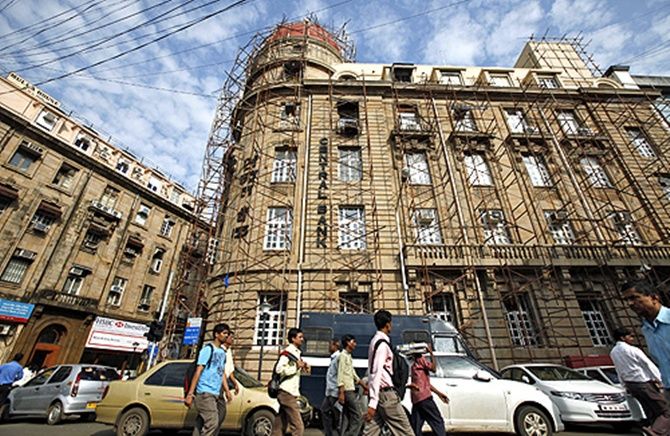The size of the hole in today's banking crisis appears to be roughly 10 per cent of GDP. That is roughly the cost of building a comprehensive metro system in 10 cities, says Ajay Shah.
 What does India require of its banking system? We require stability, we require efficient service delivery, we require inclusion, we require monetary policy transmission.
What does India require of its banking system? We require stability, we require efficient service delivery, we require inclusion, we require monetary policy transmission.
In all four areas, there has been cause for concern. These problems have been known for a long time; the expert committee process has figured out what's to be done.
While a few small steps have taken place, the bulk of the work in banking reform is the unfinished agenda for reforms.
Banks require sound regulation and supervision so that they do not collapse in a systemic crisis.
Occasional bank failure is necessary and healthy, but the banking system as a whole should not get into trouble.
We in India seem to do this differently. Individual banks essentially never fail (a cover-up or a bailout is always organised), but systemic crises (which are too large to cover up or bail out) seem to recur.
The size of the hole in today's banking crisis appears to be roughly 10 per cent of GDP. That is roughly the cost of building a comprehensive metro system in 10 cities. We should be unhappy when taxpayers are asked to foot this bill.
We should ask deeper questions about the failures of banking regulation and supervision.
Banks should be effective in an array of services they render the economy.
On one hand, these are mundane transactional services such as transferring money.
But the most important service that banks render the economy is to look at a firm, form a view about its future prospects, and deliver capital to firms with good future prospects.
Banks should hold back capital from firms with dubious prospects.
However, in India, too much bank lending is based on bureaucratic procedure, and too little is based on a forward-looking assessment about the prospects of a firm.
Mundane services are being performed badly owing to the lack of competition.
Most public-sector banks other than State Bank of India have difficulties in management and are in a solvency crisis.
Most private banks other than HDFC Bank and Kotak Mahindra Bank are also facing difficulties. Foreign banks have been blocked off.
New private banks are coming in at roughly two banks a decade, which is inadequate.
The entry of "payments banks" or "small finance banks" will not move the needle, and the limitations of these licenses are highlighted by decisions by three payments banks to idle their licenses.
There is no other industry in India where competition is so stifled. This gives banks little incentive to improve services.
Banks should reach out to individuals and small firms all over in India.
In mature financial systems, big companies go to the bond market, and bank credit is largely geared towards smaller firms who do not have bond market access.
In India, the bond market has been blocked and big firms use up a lot of bank credit. Banks don't reach most small firms.
More individuals have mobile phones than bank accounts. We now have a campaign to open more accounts by channelling government subsidies through bank accounts.
If subsidy money goes into a bank account and is instantly withdrawn, there is no financial inclusion.
This is not the genuine financial inclusion that comes from banks obtaining genuine users; this is mechanically chasing a target.
Why did mobile phone companies reach out to consumers in India in a way that banks do not?
Because Indian telecom does not have the entry barriers that we see against private banks, foreign banks and technological innovation.
When banks and the bond market work well, we will get monetary policy transmission.
That is, changes by the Reserve Bank of India to the policy rate will reach out and influence a large swathe of the economy.
As banks and the bond market work badly, at present the RBI is ineffectual. If the RBI changes the 91-day rate by 25 bps, little happens in the economy.
To get the work done, the rate would then have to change by large numbers, which is a bigger disruption.
Most governors lack the resolve of C Rangarajan, and settle for small changes which are irrelevant for the economy.
It is ironic that the barriers to the monetary policy transmission lie in the hands of the RBI.
The RBI has the powers to undertake significant (though not complete) reforms of the bond-currency-derivatives nexus and of banking.
The reluctance to reform at the RBI is keeping it ineffectual. This is bad for the RBI and bad for India.
These issues were understood at the level of policy thinking roughly a decade ago.
They are at the core of the expert committee reports led by Percy Mistry (2007), Raghuram Rajan (2008) and B N Srikrishna (2013).
Successive leadership teams at the Ministry of Finance and the RBI have chipped away at this agenda in some respects.
We have begun modernising the monetary policy framework with formal inflation targeting, and the true size of the banking crisis is gradually coming to light.
But the bulk of these reforms remain the unfinished agenda for the future.
The low prioritisation of banking reforms has given us a banking crisis that is hampering GDP growth, a banking system that does not deliver efficient services or financial inclusion, and a weak monetary policy transmission which makes it likely that inflation targeting will fail.
The BJP government has finished two years and has three years to go. In order to deliver improvements in the economy by 2019, it is important to switch gears on banking reforms.
The financial system is the brain of the economy. The quality of this brain determines how much GDP growth we get per unit savings.
The two weakest parts of Indian finance are banking and the bond-currency-derivatives nexus.
We need to look beyond the headlines which talk about inflation targeting, payments banks and small finance banks.
These moves create good headlines, but they do not put India on the path to a better functioning financial system.
The writer is a professor at National Institute of Public Finance and Policy, New Delhi.












 © 2025
© 2025